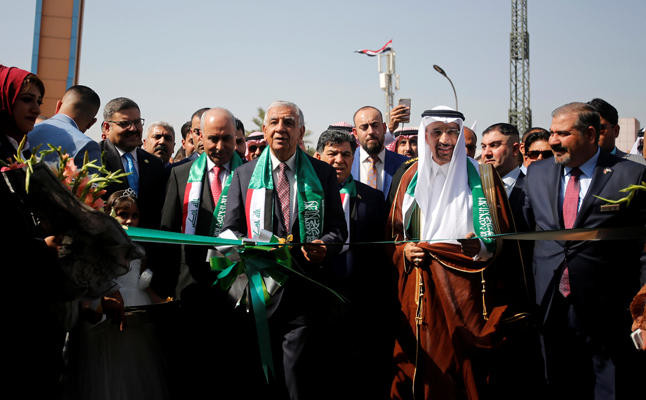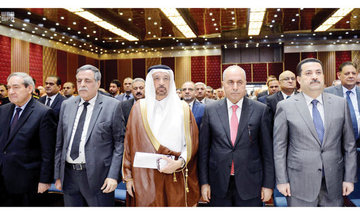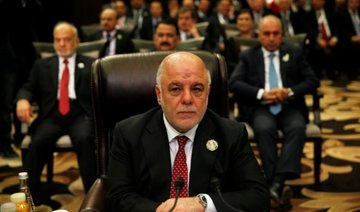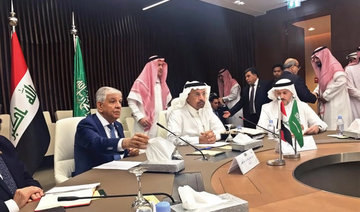JEDDAH: Saudi Arabia showcased its strong participation at the 44th Baghdad International Fair on Saturday.
Saudi Energy Minister Khalid Al-Falih and Iraqi Trade Minister Salman Al-Jumaili were among prominent figures at the inauguration of the fair running from Oct. 21 to 30 in which 18 countries and 400 local and international companies are taking part.
Al-Jumaili said that the launch of the fair coincides with the complete liberation of many Iraqi areas. “This is a clear and true message that Iraq is ready to cooperate in the fields of investment and reconstruction and is capable of fighting and combating terrorism and strengthening its relationships through real and constructive partnerships,” he said.
Al-Falih said over 60 Saudi companies are taking part in the fair which highlights the high level of Saudi participation.
He stressed “the strong cultural and economic historical bonds” between the two countries.
Saudi Exports Development Authority (SEDA) Secretary-General Saleh Al-Salami said Saudi participation emphasized the political and economic openness between the two countries.
In a separate development, US Secretary of State Rex Tillerson arrived in Riyadh on Saturday to attend a landmark meeting between officials from Saudi Arabia and Iraq aimed at improving relations between the two countries and countering Iran’s growing regional influence.
Improved relations between the two countries led to Saudi Arabian Airlines (Saudia) announcing its first flight to Baghdad on Oct. 30, according to Sabq.
This will be the first flight after 27 years of interruption.
On Wednesday, Saudi budget airline, Flynas, made a similar flight from the Kingdom to Iraq.
Baghdad trade fair strengthens Saudi-Iraqi economic ties
Baghdad trade fair strengthens Saudi-Iraqi economic ties

Ludvig Aberg cards an opening-round 63 for a 2-shot lead at the Farmers Insurance Open

- The 25-year-old Swede capitalized on playing the easier North Course at Torrey Pines, hitting 16 of 18 greens in regulation while making eight birdies and an eagle on the coastal links
- Japan’s Hideki Matsuyama, the highest-ranked player in the field and the winner at The Sentry at Kapalua, shot a 68 on the South Course
SAN DIEGO: Ludvig Aberg shot a 9-under 63 Wednesday in what he calls his favorite place in the world, taking a two-shot lead over Danny Walker and Hayden Springer in the opening round of the Farmers Insurance Open at Torrey Pines.
Aberg took a first-round lead on the PGA Tour for the first time after posting the best opening-round score of his short career. The 25-year-old Swede capitalized on playing the easier North Course at Torrey Pines, hitting 16 of 18 greens in regulation while making eight birdies and an eagle on the coastal links.
“I like when you hit a lot of drivers, and I feel like I did that a lot today, and probably going to do the same tomorrow,” Aberg said. “(I love) any golf course when it looks like this, when you have the views, and Torrey Pines is a really, really cool place.”
The 25-year-old Walker was outstanding in his fourth career PGA Tour start. He posted the opening day’s best round on the tougher South Course, where the scoring average was 72.487 compared to 70.218 on the North.
Walker and Springer finished one shot in front of Lanto Griffin, Zac Blair, 48-year-old Zach Johnson and 20-year-old Aldrich Potgieter — all of whom played the North Course.
Japan’s Hideki Matsuyama, the highest-ranked player in the field and the winner at The Sentry at Kapalua, shot a 68 on the South Course.
Aberg, who finished ninth last year in his Torrey Pines debut, began the new season with a fifth-place finish in Maui after undergoing knee surgery last fall. After winning the tour’s rookie of the year award in 2023, he went winless last year despite posting six top-five finishes, including runner-ups at the Masters, the AT&T Pebble Beach Pro-Am and the BMW Championship.
While many top players aren’t at Torrey Pines this week, Aberg couldn’t wait to get out to the beautiful coastal course, calling San Diego “my favorite place in the world” earlier this week.
Aberg also said he would love it if the Genesis Invitational is held here in three weeks. The tournament is expected to announce its 2025 home soon after being moved away from Riviera Country Club because of the deadly wildfires that destroyed part of the Pacific Palisades neighborhood of Los Angeles, near the famed course.
“I haven’t had any issues since the surgery, so it’s really nice,” Aberg said. “I think Maui was the ultimate test for that. I got some blisters on my feet. That’s another story, but the knee was holding up nice. Really looking forward to coming back and playing a lot of tournaments. ... I’m looking forward to a nice stretch of golf.”
Walker, a rookie who who earned his PGA Tour card on the Korn Ferry Tour, turned in a bogey-free round after missing his first two cuts of the season.
Johnson hasn’t won on tour since the 2015 British Open at St. Andrews, but he started impressively at Torrey Pines after getting in on a sponsor’s exemption.
Defending champion Matthieu Pavon shot a 73 on the South Course.
This famed tournament on the northern coast of San Diego has fewer stars than normal in its field this year. World No. 2 and San Diego native Xander Schauffele didn’t enter, while fifth-ranked and Southern California native Collin Morikawa withdrew on Sunday, followed by former Torrey Pines runner-up Will Zalatoris on Wednesday morning.
The Farmers Insurance Open starts on a Wednesday and ends on a Saturday to avoid a final-round conflict with the NFL’s conference championship games.
Elimination stares Man City in the face, Real Madrid rout Salzburg to advance

- Arsenal beat Dinamo Zagreb 3-0 and Inter won 1-0 at Sparta Prague that lifted both to 16 points, three clear of ninth-place Aston Villa
- Celtic secured their place in the knockout rounds by winning 1-0 against last-place Young Boys, the other team to lose seven times
LONDON: Manchester City are on the brink of a humiliating Champions League exit after a stunning loss to Paris Saint-Germain on Wednesday, and Real Madrid are no longer at risk after routing Salzburg.
Man City blew a two-goal lead in a high-stakes clash of super-wealthy underachievers that PSG won 4-2 in Paris yet still could be eliminated alongside the English champions after the final round of games next week.
Only the top 24 in the 36-team standings will advance and Man City, the 2023 champion, will kick off in 25th place but will squeeze into the knockout playoffs round by beating Club Brugge.
“We will do everything there and if we don’t do it we don’t deserve it,” manager Pep Guardiola said of the game in Manchester in one week’s time. Brugge needs just a draw to advance.
PSG rose to 22nd place to set up another tense challenge, at 24th-place Stuttgart which likely needs to win.
Early in the second half in Paris, it was Man City looking set to send PSG close to elimination by taking a two-goal lead. Jack Grealish, a halftime substitute, scored in the 50th minute then his pass across the goalmouth was deflected toward Erling Haaland for a second four minutes later.
Within six remarkable minutes PSG were level, from goals by Ousmane Dembele and Bradley Barcola, and a stunning turnaround was completed in the 78th when Joao Neves headed the decisive goal. Gonçalo Ramos added a fourth in stoppage time.
Madrid advance to knockout phase
After winning a record 15th European title last season, then signing France star Kylian Mbappe in the offseason, it probably should not have been such a drama for Real Madrid to reach the knockout stages in the new Champions League format.
But three losses in six games — to Lille, AC Milan and Liverpool — left Madrid in 22nd place at kickoff Wednesday, before swatting aside Salzburg 5-1 to rise into 16th.
Brazil stars Rodrygo and Vinicius Junior each scored twice, either side of a goal for Kylian Mbappé, in a mismatch ahead of the teams meeting again in the FIFA Club World Cup, in Philadelphia on June 26.
Arsenal, Inter and Milan secure wins
Arsenal and Inter got expected wins to rise to third and fourth, respectively, though not sure yet to join Liverpool and Barcelona among the top-eight teams advancing direct to the round of 16.
Arsenal beat Dinamo Zagreb 3-0 and Inter won 1-0 at Sparta Prague that lifted both to 16 points, three clear of ninth-place Aston Villa.
AC Milan quietly went about its business rising to sixth place with a 1-0 win against Girona at San Siro, on a powerful strike in the first half by Rafael Leão.
Bayern slump , risk tough path ahead
Bayern Munich fell to a 3-0 defeat at Feyenoord and dropped to 15th in the mid-table morass of storied clubs — currently including Madrid and Juventus — who risk facing each other in the knockout playoff rounds in February.
The teams that finish Nos. 15-18 in the standings next week will be drawn against each other in the playoffs — for the right to face Liverpool and, likely, Barcelona in the round of 16.
Bayern are fortunate to have one of the easier-seeming final games, at home to Slovan Bratislava, which have lost seven straight.
Celtic secured their place in the knockout rounds by winning 1-0 against last-place Young Boys, the other team to lose seven times.
Leipzig ended their six-game losing run with a 2-1 win over Sporting Lisbon, though the champion of Portugal still is favored to advance. Shakhtar Donetsk stayed in contention — just — with a 2-0 win against Brest, who will be in the knockout phase.
Final round
All 36 teams will be in action at the same time next Wednesday in 18 games kicking off at the same time — 9 p.m. Central European Time (2000 GMT).
The top eight in the final standings get a break until March, waiting for the round of 16. Teams that finish from ninth to 24th enter the knockout playoffs. Those two-leg pairings are drawn Jan. 31 at UEFA headquarters in Nyon, Switzerland.
Guests of the Custodian of the Two Holy Mosques Program arrive in Madinah

- The third batch of the guests include 250 people from African countries, with the Egyptian delegation of 22 Umrah performers arriving as ahead
- The program is set to host a total of 1,000 visitors from 66 countries divided into four batches for this year, as approved by King Salman
MADINAH: The third batch of participants in the Custodian of the Two Holy Mosques’ Program for Umrah and Visitation for Islamic year 1446 began arriving in Madinah on Wednesday.
Their 10-day visit to the Kingdom includes prayers at the Prophet’s Mosque, performing Umrah, and touring historical and cultural landmarks as well as museums in Madinah and Makkah.
Officials from the Saudi Ministry of Islamic Affairs, Dawah, and Guidance welcomed the program’s guests at Prince Mohammad Bin Abdulaziz International Airport in Madinah.
The Egyptian delegation, comprising 22 Umrah performers, was the first to arrive among the third batch, which includes 250 people from 18 African countries: Egypt, Morocco, Tunisia, Algeria, Mali, Senegal, Cameroon, Chad, Kenya, Nigeria, Uganda, South Africa, Madagascar, Ethiopia, Mauritius, Guinea, Mozambique, and Mauritania.
The program is set to host a total of 1,000 visitors from 66 countries divided into four batches for this year, as approved by King Salman.
Southern forces loom large as Syria’s new rulers try to form a national army

- When the HTS-led opposition groups based in the north launched their surprise offensive last year in Aleppo, factions in the southern provinces of Daraa, Sweida and Quneitra reactivated, forming a joint operations room to coordinate with northern ones
NAWA, Syria: As opposition forces raced across Syria in a surprise offensive launched in the country’s northwest late last year, officials from several countries backing either the rebels or Syria’s government met in Qatar on what to do.
According to people briefed on the Dec. 7 meeting, officials from Turkiye, Russia, Iran and a handful of Arab countries agreed that the fighters would stop their advance in Homs, the last major city north of Damascus, and that internationally mediated talks would take place with Syrian leader Bashar Assad on a political transition.
But opposition factions from Syria’s south had other plans. They pushed toward the capital, arriving in Damascus’ largest square before dawn. Those from the north, led by the Islamist group Hayyat Tahrir Al-Sham, arrived hours later. Assad, meanwhile, had fled.
HTS, the most organized of the groups, has since established itself as Syria’s de facto rulers after coordinating with the southern fighters during the lighting-fast offensive.
Wariness among the southern factions since then, however, has highlighted questions over how the interim administration can bring together a patchwork of former rebel groups, each with their own leaders and ideology.
HTS leader Ahmad Al-Sharaa has called for a unified national army and security forces. The interim defense minister, Murhaf Abu Qasra, has begun meeting with armed groups. But some prominent leaders like southern rebel commander Ahmad Al-Awda have refused to attend.
Officials with the interim government did not respond to questions.

Cradle of the revolution
The southern province of Daraa is widely seen as the cradle of the Syrian uprising in 2011. When anti-government protests were met with repression by Assad’s security forces, “we were forced to carry weapons,” said Mahmoud Al-Bardan, a rebel leader there.
The opposition groups that formed in the south had different dynamics from those in the north, less Islamist and more localized, said Aron Lund, a fellow with the Century International think tank. They also had different backers.
“In the north, Turkiye and Qatar favored Islamist factions very heavily,” he said. “In the south, Jordanian and American involvement nudged the insurgency in a different direction.”
In 2018, factions in Daraa reached a Russian-mediated “reconciliation agreement” with Assad’s government. Some former fighters left for Idlib, the destination for many from areas recaptured by government forces, while others remained.
The deal left many southern factions alive and armed, Lund said.
“We only turned over the heavy weapons … the light weapons remained with us,” Al-Bardan said.
When the HTS-led opposition groups based in the north launched their surprise offensive last year in Aleppo, those weapons were put to use again. Factions in the southern provinces of Daraa, Sweida and Quneitra reactivated, forming a joint operations room to coordinate with northern ones.
Defying international wishes
On Dec. 7, “we had heard from a number of parties that there might be an agreement that … no one would enter Damascus so there could be an agreement on the exit of Bashar Assad or a transitional phase,” said Nassim Abu Ara, an official with one of the largest rebel factions in the south, the 8th Brigade of Al-Awda.
However, “we entered Damascus and turned the tables on these agreements,” he said.

Al-Bardan confirmed that account, asserting that the agreement “was binding on the northern factions” but not the southern ones.
“Even if they had ordered us to stop, we would not have,” he said, reflecting the eagerness among many fighters to remove Assad as soon as possible.
Ammar Kahf, executive director of the Istanbul-based Omran Center for Strategic Studies, who was in Doha on Dec. 7 and was briefed on the meetings, said there was an agreement among countries’ officials that the rebels would stop their offensive in Homs and go to Geneva for negotiations on “transitional arrangements.”
But Kahf said it was not clear that any Syrian faction, including HTS, agreed to the plan. Representatives of countries at the meeting did not respond to questions.
A statement released by the foreign ministers of Turkiye, Russia, Iran, Qatari, Saudi Arabia, Jordan and Iraq after the Dec. 7 meeting said they “stressed the need to stop military operations in preparation for launching a comprehensive political process” but did not give specifics.
The initial hours after armed groups’ arrival in Damascus were chaotic. Observers said the HTS-led forces tried to re-impose order when they arrived. An Associated Press journalist saw an argument break out when HTS fighters tried to stop members of another faction from taking abandoned army munitions.
Abu Ara acknowledged that “there was some chaos” but added, “we have to understand that these people were pent-up and suddenly they achieved the joy of victory in this manner.”

Waiting for a state
During a visit by AP journalists to the western countryside of Daraa province this month, there was no visible presence of HTS forces.
At one former Syrian army site, a fighter with the Free Syrian Army, the main faction in the area, stood guard in jeans and a camouflage shirt. Other local fighters showed off a site where they were storing tanks abandoned by the former army.
“Currently these are the property of the new state and army,” whenever it is formed, said one fighter, Issa Sabaq.
The process of forming those has been bumpy.
On New Year’s Eve, factions in the Druze-majority city of Sweida in southern Syria blocked the entry of a convoy of HTS security forces who had arrived without giving prior notice.
Ahmed Aba Zeid, a Syrian researcher who has studied the southern insurgent groups, said some of the factions have taken a wait-and-see approach before they agree to dissolve and hand over their weapons to the state.
Local armed factions are still the de facto security forces in many areas.

Earlier this month, the new police chief in Daraa city appointed by the HTS-led government, Badr Abdel Hamid, joined local officials in the town of Nawa to discuss plans for a police force there.
Hamid said there had been “constructive and positive cooperation” with factions in the region, adding the process of extending the “state’s influence” takes time.
Abu Ara said factions are waiting to understand their role. “Will it be a strong army, or a border guard army, or is it for counterterrorism?” he asked.
Still, he was optimistic that an understanding will be reached.
“A lot of people are afraid that there will be a confrontation, that there won’t be integration or won’t be an agreement,” he said. “But we want to avoid this at all costs, because our country is very tired of war.”
Olympic push for kho kho, India’s ancient tag sport

- Nearly a century later, enthusiasts have sought to raise its profile with the inaugural Kho Kho World Cup featuring teams from 23 nations competing in India’s capital New Delhi
NEW DELHI: The ancient game of kho kho is enjoying a resurgence in India, with organizers of the first international tournament hoping their efforts will secure the sport’s place in the Olympics.
Kho kho, a catch-me-if-you-can tag sport, has been played for more than 2,000 years across southern Asia but only saw its rules formalized in the early 20th century.
It was played as a demonstration sport at the 1936 Olympics in Berlin but did not gather enough support to be included in the Summer Games and since then has been largely eclipsed by India’s ferocious love of cricket.
Nearly a century later, enthusiasts have sought to raise its profile with the inaugural Kho Kho World Cup featuring teams from 23 nations competing in India’s capital New Delhi.
The tournament’s opening ceremony saw a gala of song, dance and an Olympic-style team parade, reflecting the aspirations of organizers and athletes to take the sport global.
“My elder sister played the sport, but was not able to pursue her dreams,” Indian women’s team player Nasreen Shaikh, 26, told AFP.
“We have crossed the first barrier of playing in a World Cup. The next big step would be an entry in the Olympics.”
Kho kho is traditionally played outside on a rectangular court, divided in two by a line that connects two poles at either end of the field.
Teams switch between attack and defense, with the former chasing and tagging defending players around the field.
Only one player can give chase at a time and attacking players can only move in one direction around the court, forcing them to tag in team-mates crouched on the center line to take over pursuit.
The match is won by whichever team can gain the most points, primarily by tagging defenders faster than the opposing team.
The franchise-based Ultimate Kho Kho League, founded in 2022, brought the sport off grassy fields and onto indoor mats, also boosting its profile with a television audience.
Since then the league has become the third most-watched non-cricket sports tournament in the world’s most populous country after the Pro Kabaddi League — another ancient Indian tag sport — and the Indian Super League football competition.
“The turning point was when it transitioned from mud to mat. It made it into a global game,” Kho Kho Federation of India president Sudhanshu Mittal told AFP.
“Today we are in 55 countries... Native players in countries like Germany, Brazil, and Kenya are embracing the game because of its speed, agility and minimal equipment required.”
Mittal said he expected the sport to gain a foothold in dozens more countries by the end of the year, giving it a strong claim to be featured in the Olympics in the coming decade.
That would coincide with India’s audacious bid to host the 2036 Games in the city of Ahmedabad, 100 years after kho kho last appeared at the Olympics.
The United States, England and Australia were among the nations that competed in this month’s World Cup in New Delhi, with expatriate Indians heavily represented after taking the game to foreign shores.
But Pakistan is a glaring omission from the competition despite the sport being popular there — a reflection of the deep animosity between the nuclear-armed archrivals.
World Cup organizers refused to comment on the absence, which failed to dim the sense of optimism at the competition that the sport is destined to thrive.
“There has been a sea change in the sport,” Indian men’s team captain Pratik Waikar, 32, told AFP.
“Cricket has a rich history and they developed it well by going live on TV, and now our sport has also gone live,” he said. “In the next five years it will be on another level.”


















